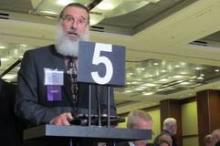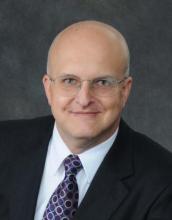CHICAGO – The American Medical Association House of Delegates voted to defer taking action on Medicaid payment policy so that the primary care societies can continue an almost-year-long lobbying effort to convince Congress to extend a Medicaid pay increase.
The pay increase, established under the Affordable Care Act, brings Medicaid pay up to the same level as Medicare reimbursement for eligible primary care physicians. Currently, family physicians, general internists, pediatricians, and subspecialists in those categories are eligible for the pay increase if they are board certified or can show that at least 60% of the codes they submitted to Medicaid in 2012 were for primary care services. The increase expires on Dec. 31.
At least a year ago, the American Academy of Family Physicians, the American College of Physicians, the American Academy of Pediatrics, the American College of Obstetricians and Gynecologists, and the American Osteopathic Association struck an agreement to urge Congress to extend the pay increase for at least 2 years, and to add ob.gyns. to the list of eligible specialists, Dr. Reid Blackwelder, president of the AAFP, said at the House of Delegates meeting.
He offered a resolution to the House to include ob.gyns. as eligible, but the amendment led to some confusion.
The AMA Council on Medical Service was already recommending that the AMA advocate for both an extension of the payments and to add ob.gyns. to the eligibility list, as AMA policy recognizes them as a primary care specialty.
Initially, an amendment had been offered suggesting that ob.gyns. would have to meet different requirements to get the increased pay. That upset some delegates. But Dr. Blackwelder said that his amendment would "use the same accepted threshold methodology" as for internists, pediatricians, and family physicians.
Even so, many delegates said they were not in favor of the resolution. Dr. Lisa Egbert, an ob.gyn. on the Council on Medical Service, said that for one, current legislation did not give her specialty an opportunity to receive the pay increase. The Council report gave clear directions on how the AMA could lobby Congress to change that, she said.
As debate began again the next day, delegates from the AAFP and the ACP retreated from their amendment, and instead asked that it, along with any AMA action on the pay parity issue, be deferred. They noted the ongoing joint effort by the AAFP, ACP, AAP, and ACOG to help persuade Congress that pay parity needed to be extended.
The four societies sent a letter to Senate Finance Committee leaders Ron Wyden (D-Ore.) and Orrin Hatch (R-Utah) and House Energy & Commerce Committee leaders Fred Upton (R-Mich.) and Henry Waxman (D-Calif.) on May 21, seeking the 2-year extension and also to add ob.gyns.
On June 10, it was resent to the same legislators with 16 additional signatories including other osteopathic organizations, the Society of Hospital Medicine, and the Children’s Hospital Association.
Dr. Yul Ejnes, an ACP delegate and a previous ACP board chairman, urged the AMA delegates to defer action. Otherwise, "it would be injurious to [our] effort, as well as to our AMA, if this body came out with different policy that contradicted what the four organizations are trying to do," said Dr. Ejnes.
AAFP Board Chair Jeffrey Cain agreed. "It would be injurious to the AMA’s reputation to come out against the four groups representing primary care on Capitol Hill," he said.
The delegates voted 223-174 to put off action, referring the amendments and the Council’s report for study by the AMA’s Board of Trustees.
On Twitter @aliciaault



